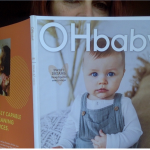Ladies and Gentlegeeks,
Just like President-Elect Biden and Vice President-Elect Harris, I am celebrating a milestone. Theirs is the upending of Team Orange, mine is much less earth-shattering but nonetheless important. It’s been ten days since I submitted my Master’s thesis for marking (whoop, whoop!).
Some key findings … may I?
- Today’s adults are likely to use smartphones, which are pervasive in their abundance and persuasive in their design. Using a smartphone while caring for infants is associated with suboptimal outcomes for the parent/child relationship, and therefore child development.
- There has been an absence of empirical information about the extent to which mothers’ smartphone use reflects an understanding of potential harm, and whether their smartphone perceptions, intentions and behaviours change at the transition to parenthood. So … we ran a study …
- Pre- and post-partum, matched-controlled observational design, in which first time mothers (n=65) and their nominated (childless) “research buddies (RB)” (n=29) were surveyed and used a screen-time tracking app (Moment) for seven days
- Data were gathered during the final trimester of pregnancy, and again at 6-8 weeks postpartum
- Pregnant women and RB had mean phone use of 205 and 198 minutes/day (range: 37-562 mins/day, 61-660 minutes/day), respectively.
- Pregnant women and RB had mean daily phone pickups of 53 and 54 (range: 2-223 pickups/day, 5-142 pickups/day) respectively
- After child birth, both groups saw increases in both measures, the new mothers’ time on device increase was statistically significant (p<0.001), as was the RB pickup increase (p=0.04).
- These measured increases are in contrast to a reduction in both groups’ scores on the Mobile Phone Problem Use Scale, 10 question version (MPPUS-10), a self-report scale designed to assess problematic use or overuse of the smartphone.
- This suggests that women’s perceptions of their smartphone differed from their objectively measured use.
- These findings, along with other results from the survey, reinforce calls by other researchers regarding the need for guidelines for new parents about limiting smartphone use in the presence of infants.
- This thesis includes this call for guidelines as part of a suite of recommendations to support new mothers in enjoying the benefits of smartphone use while minimising the potential for harm to the parent/infant relationship, and therefore to child development.
It was early last Friday morning that I clicked “SEND” on the project I’ve been working so hard on for years, and I felt a luscious sense of relief … for all of 15 minutes. Then the 7am news bulletin reminded me that I gotta get back to work, ASAP. Y’see, last Friday morn saw the release of some results of a study being run between UC and Auckland uni, examining the school readiness of NZ’s five year olds. Spoiler alert: things are not fab for our littles, especially with regard to their language abilities.
I’ve been interested in transition to school since way back (HERE is a link to an article I wrote for OHbaby! mag about “rethinking school readiness, years ago!) and so I was most interested in the extended interview with one of the lead researchers and a school principal who had supported the study. (OH and how gratifying to hear the principal namechecking our man Bruce Perry and the relevance of teachers becoming trauma-informed. Especially in Christchurch, eh friends?).
SO: yes, children are the canaries in our societal coalmine. The school readiness standards of the past are showing wobbly chinks. So … do we change expectations in classrooms? This would mean that we all accept that relationships and play may need to BE the curriculum, that we might need the back up of evidence based classroom based supports like Nurture Groups and Roots of Empathy.
AND/OR this might emphasise the need for support for families – let us never forget Bronfenbrenner and his reminder that we ought consider children as members of the nest of their whānau/family, who are themselves members of a community, a society, a species. What’s more, that research reminds us of the need for children to have rich conversations. Kids have gotta be sung to enthusiastically, and bathed in language daily (some might say: Talking Matters!). Of course.
May I suggest … we do both? Can we keep a watchful eye on children’s needs and their achievements even as we keep a gentle grasp on those education standards? Can we wrap around individual children & families as we advocate for broader change? With excessive screen time being implicated for distracting parents and children, we could insist that Big Tech be broken up … or at least better regulated. We could demand design solutions that avoid Human Downgrading and support real-life connection: ESPECIALLY when children are in the room.
Much work to be done, my lovelies. So make your celebrations heartfelt and swift, then get yourselves back to work. In my case, that means prepping for a presentation on Thursday, creating a research summary for the mamas who helped me out (and other interested parties!) and writing a wee 1700 word article. I’d feel sorry for myself, but these are easy goals compared to what Biden & Harris gotta do – defeat a pandemic, reunify a nation, weed out systemic racism etc! My to-do list is a comparative piece of cake! Go well, work hard, be kind x x x






